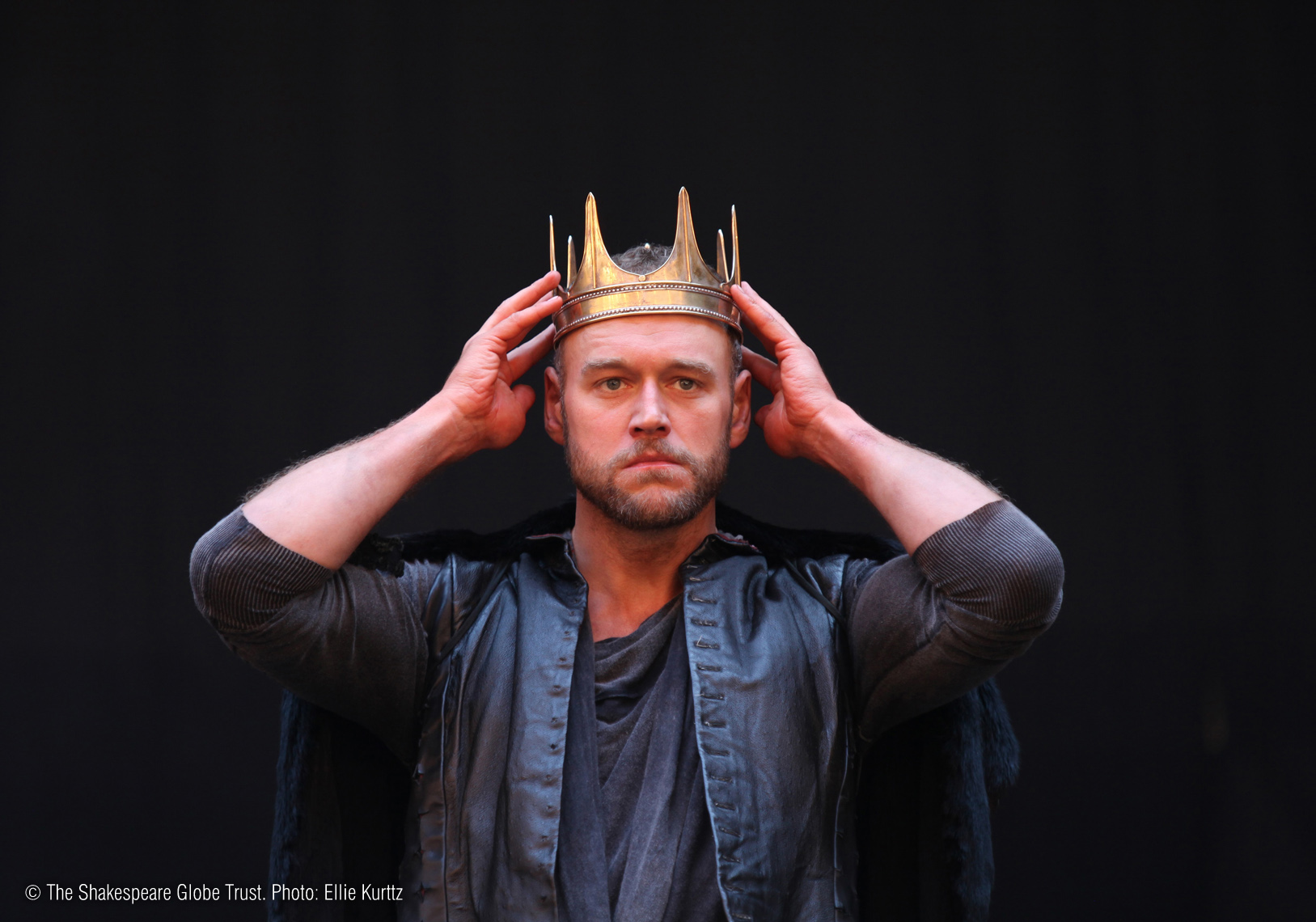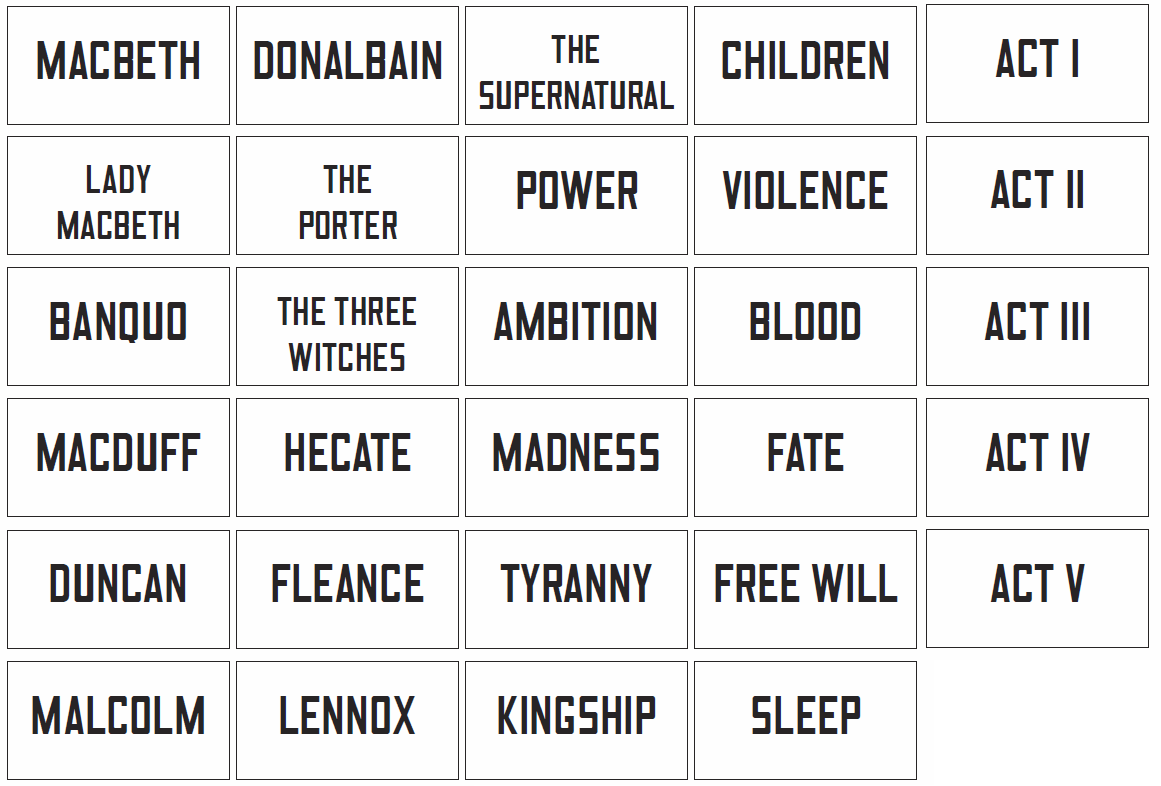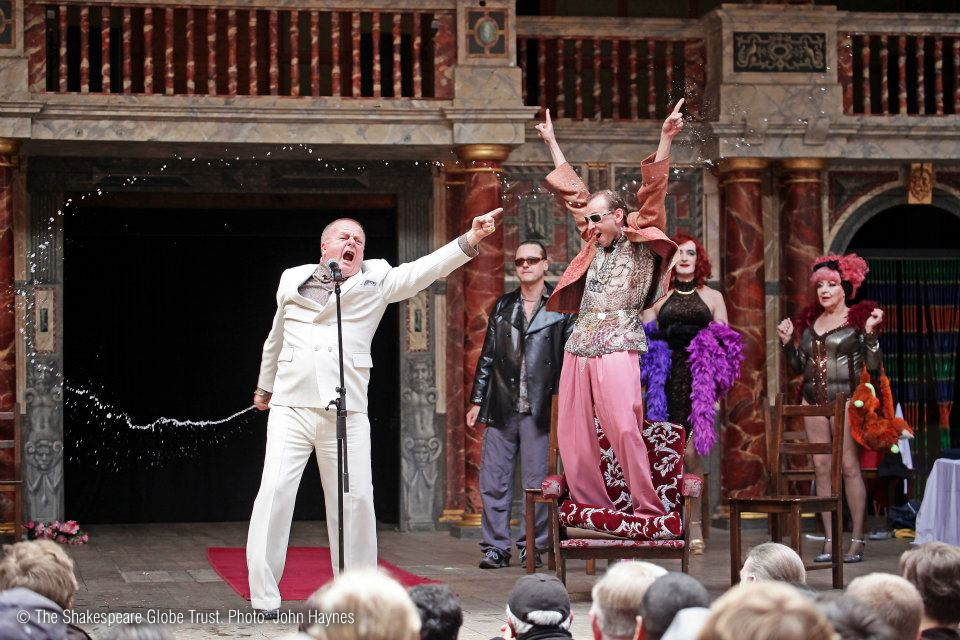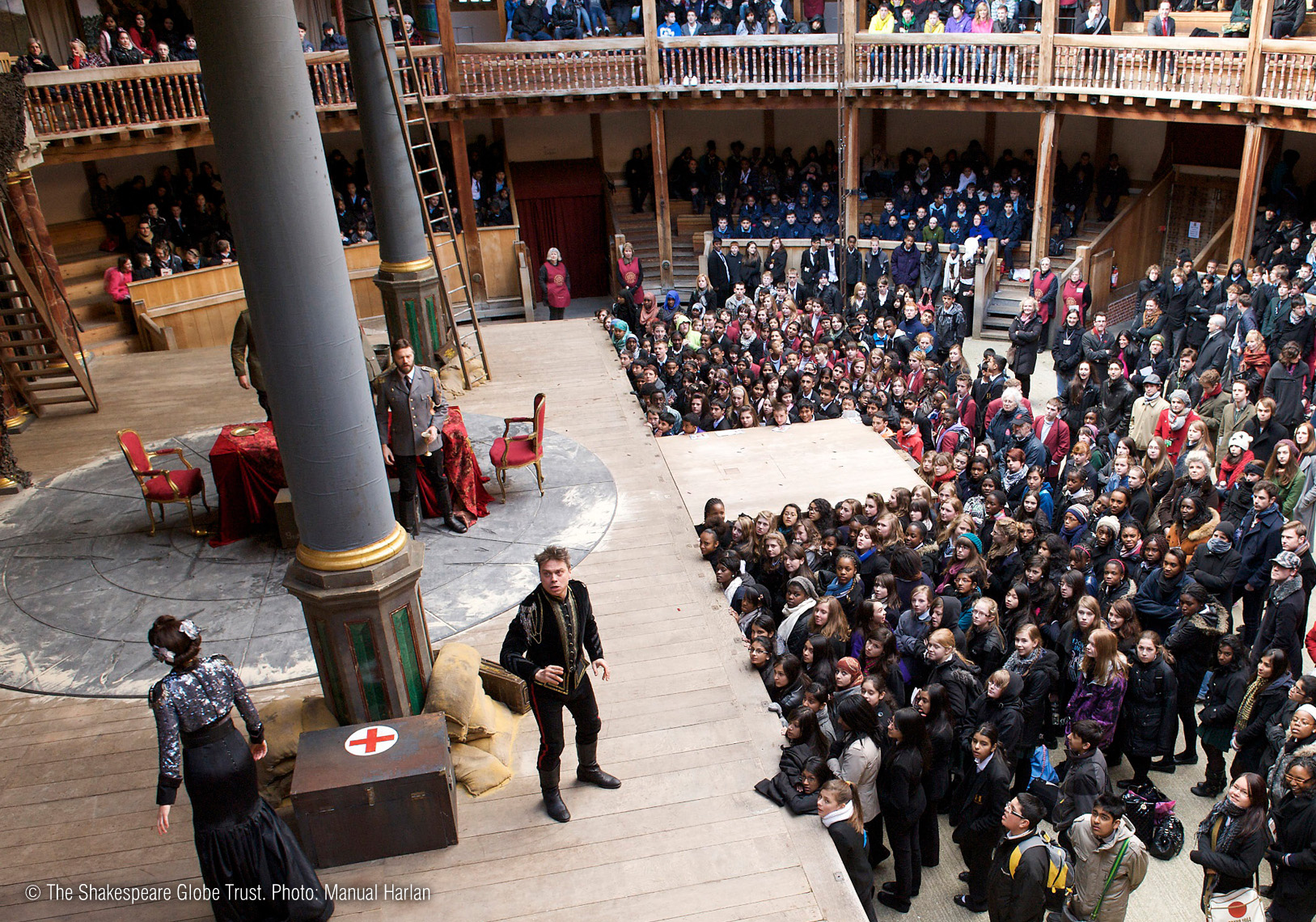In these lessons, students will engage with the themes and ideas at the heart of the text, including the supernatural, power and loyalty. Tasks include: tracking recurring themes throughout the text; a close reading of the witches and apparitions in Act 4, Scene 1; and a card game which will help connect themes to characters and the text.
In order to benefit fully from these lesson plans, we recommend you use them in the following order:
If students are new to the play, we suggest you start with these introductory KS3 Lesson Plans. If you would like to teach the play in greater detail, use the advanced KS4/5 Lesson Plans.
These lesson plans are available in the Downloads section at the bottom of this page. To download resources, you must be logged in. Sign up for free to access this and other exclusive features. Activities mentioned in these resources are available in a separate downloadable 'Student Booklet', also at the bottom of this page. The 'Teachers' Guide' download explains how best to use Teach Shakespeare and also contains a bibliography and appendices referencing the resources used throughout.
Key Questions for Students:
Can I explain what is meant by ‘theme’?
Can I list some of the key themes of Macbeth?
Key words: betrayal, death, family, loyalty, power, succession, supernatural, theme, trust, violence, war
Prologue: Opening Discussion
Display a montage of images connected to the plot of Macbeth. This is available in the Props PowerPoint in the Downloads section of this resource. Students should first of all identify as many items as they can from the montage (e.g. dagger), and secondly pick out as many ideas, themes and issues as they can that are suggested by the images in the montage (e.g. power, death, violence, war).
Enter the Players: Group Tasks
1) Theme statues
Students are given pieces of paper which represent plaques for statues. They should write down the key themes of the play on these plaques, e.g. power, ambition, family, trust, fate, loyalty, unity, etc. Students work in pairs or threes to sculpt themselves into poses representing statues for the Scottish king’s castle. Which statues would Duncan choose for his castle? Which ones would Macbeth choose? What about Malcolm? As an extension activity, students could embellish the plaques by having an appropriate quotation from the play engraved onto each plaque. There is a page to create some theme ‘plaques’ in the Student Booklet.

2) Recurring nightmares, recurring dreams
A theme can be defined as a recurring idea within a work of literature or other work of art. It could even be described as an idea that ‘haunts’ a work of literature, particularly if the theme is a rather sinister and eerie one! In groups, students could be assigned a macabre theme from Macbeth: violence, the supernatural, evil or madness. They should then identify at least three occasions when that theme makes its presence felt in the text. How and why does Shakespeare do this?
- echoes (what would the audience hear? e.g. repeated words or phrases, other sounds)
- visions (what would the audience see? e.g. action and stagecraft )
- feelings (how would this make the audience feel?)
One or two groups could be asked to track more positive themes to look at how Shakespeare sows the seeds of a more hopeful resolution to the play, particularly through the figure of Macduff: e.g. goodness, healing, heroism, unity.
3) Pick a card...
Themes are important throughout a work of literature. To be able to write well about a theme in Macbeth, students will need to track its importance at different points in the play. Have students randomly select a card from each pile: a character, a theme, and a section of the play. The template for these cards can be found in the downloadable Lesson Plans at the bottom of this page. This game could be used in the following ways:
- to support students in becoming more familiar with the play, and in moving more confidently around it and making quick connections
- as a revision tool without the text
- as the basis for detailed small group discussion involving close analysis of a specific passage, through the lenses of particular characters and themes
- to prepare students for exam questions which ask them to write about one part of the play in the context of the whole text

Exeunt: Closing Questions for Students
What would I say are the main themes in the Macbeth?
What kinds of connections can I make between these themes?
How might a director draw out these themes on stage?
Suggested plenary activity…
Ask students to write a spell that lists the main themes from the play, using the witches’ spell from Act 4 Scene 1 as a model.
Aside: Further Resource
- Students can play around with icons representing important themes from the play in this Clan Badge Maker: 2011.playingshakespeare.org/node/98.

Epilogue: Teacher's Note
Each of the themes mentioned in this learning sequence has a dedicated lesson within these materials. In depth activities linked to ‘Trust and Betrayal’ and ‘The Supernatural’ follow here in the Key Stage 3 section. Look in the Key Stage 4 materials for sections about ‘Appearance and Reality’, ‘Power and Ambition’, ‘Family and Succession’ and ‘Guilt and Conscience’ and for detailed guidance on writing about themes.
Key Questions for Students:
Can I investigate how Shakespeare explores the themes of trust and betrayal in Macbeth?
Can I explain how and why Macbeth goes from being a loyal subject to a murderous traitor?
Key words: allegiance, betrayal, loyalty, treachery, trust
Prologue: Opening Discussion
trusting, trustworthy, traitor, credulous, gullible, loyal, faithful, naïve, allegiance, treachery, betrayal, believe, mistrust, doubt, wary, loyalty, faith, betray, suspicious, suspect
- Group 1: find two words that mean the same thing
- Group 2: find two words that are opposites
- Group 3: find two words that have similar meanings but one sounds like a compliment and one sounds like a criticism
- Group 4: find two words that are nouns
- Group 5: find two words that are adjectives
- Group 6: find two words that are verbs
- Group 7: find two words that you might use about the relationship between a ruler and a subject
- Group 8: find two words that you might use about a marriage
Enter the Players: Group Tasks
1) Trust games
The following two games, taken from Jessica Swale’s Drama Games for Classrooms and Workshop, will support students in talking about trust and developing trust as a group of players. (More detailed explanations of each game can be found in Swale’s book.)
- Friendly Follower: A pair of students each has a turn of one leading the other around the room holding hands. The follower must have their eyes closed and the leader must ensure the follower is safe and doesn’t bump into things. Repeat, but this time the contact is reduced to fingertip to fingertip. Repeat for a third time with only the sound of the leader’s voice guiding the follower.
- Falling Trees: One student stands in the middle of a tight circle of 6 to 8 students with no gaps. The students in the circle put their hands up, palms facing out and the student in the centre should have their arms up against their chest and their eyes closed. The student in the middle should gently start to lean and ‘fall’ like a falling tree. The group supports and protects the falling student, gently pushing them back and forth. Take it in turns to be the ‘falling tree’.
2) Text detectives: trust and distrust
For this activity, students will be closely reading and analysing two scenes from Act 1, in which trust and betrayal are established as important themes in the play. Model a close analysis of Act 1 Scene 2. Students could work more independently in groups looking for textual evidence in Act 1 Scene 4, and then collect their evidence in the ‘notebook’ in their Student Booklet.
- Q) Who does Duncan trust? How do we know?
- Q) Who doesn’t Duncan trust? How do we know?

3) Murder suspects
This activity can be used as a follow-up to ‘Text detectives’ and it is another activity that makes use of students’ language analysis skills. Duncan has been murdered and students must make notes about suspects and what their motives for murder might be. Say to students that they don’t have much evidence to go on, but that a new piece of evidence has come to light. It is a recording of Macbeth (taken from a speech in Act 3 Scene 1):
Read these lines or play the recording of them. Students should make notes in the Student Booklet about:
A: any evidence they feel is incriminating in relation to Duncan’s murder
B: any evidence of new crimes being plotted
C: any clues about motives for these crimes
Exeunt: Closing Questions for Students
Does Macbeth trust anyone in the play?
How trusting is the relationship between Macbeth and Lady Macbeth?
What part do trust and betrayal play in the relationships between different characters in Macbeth?
Suggested plenary activity…
Create a colourful, illustrated mindmap with the words ‘trust/betrayal’ in the middle. Reflect the importance of these themes in the play in terms of characters, their situations, relationships and their motivations.
Epilogue: Teacher's Note
Students could write an account of their experiences of the trust games in the Rehearsal Diary pages of the Student Booklet. They should give examples of how these insights could be reflected in the way a certain character might be played, or how a certain scene might be staged.
Key Questions for Students:
Can I identify why Macbeth has a reputation for being a dark and unsettling play?
How might modern and Jacobean audiences react to the supernatural elements in the play?
Key words: audience, apparition, context, curse, supernatural
Prologue: Opening Discussion
Students could be shown the following words: prophecy, ghost, omen, apparition, witch, curse, superstition. They should:
- Write down what they think the connection is between all of the words.
- Choose one word and create a word web around it. Students should include on their word web:
- what the word makes them think of
- what the word means to them
- connections to other stories, films, poems, news stories, etc.
- any ideas about the connection between their word and Macbeth
Given the topic of the lesson, students can go to town making their word webs look spidery! Take feedback on each word.
Enter the Players: Group Tasks
1) The Macbeth curse
Read the handout ‘The curse of Macbeth’ in the Student Booklet, taken from Ben Crystal’s book Shakespeare on Toast. Students should answer the quick information retrieval questions and then come up with a list of reasons why, in Crystal’s words, ‘Macbeth seems to cause a certain amount of trepidation.’ Finally an extension question asks students to consider why the play might have caused a great deal of trepidation on the part of audiences as well as players when it was staged. Students could try to include some of the vocabulary from the starter activity. This question, requiring some research, would work well as a homework task.
2) Staging the banquet scene
As an introduction to this task, students could look closely at three images from past productions of the banquet scene in Macbeth at the Globe. They should comment on some of the different staging decisions and give evidence. These can be shown to students using the The Table’s Full PowerPoint (available in the Downloads section at the bottom of this page).



Take some brief feedback about what they have noticed, and then watch Act 3 Scene 4 of the 2010 production starring James Garnon:
Discuss with students how they interpret this staging of the scene, thinking about:
- the effect of the audience being able to see Banquo
- the effect of the audience being able to see Banquo before Macbeth does
- the use of music in this scene and its effects
- the effect of Banquo’s reappearance in the galleries
Taking all of this analysis into consideration, ask students whether they think that Macbeth’s vision of Banquo has a supernatural explanation. Is Banquo really haunting Macbeth? How else might we interpret his appearance?
3) 'Call ‘em; let me see’em.'
There is plenty of scope in Act 4 Scene 1 for spectacle when Macbeth returns to the witches. Macbeth demands answers and what follows in the script opens up a wealth of opportunities in terms of drama and design. Students should read lines 68-133 from the Student Booklet as a class or in groups, with one student reading the stage directions. Students can briefly discuss ideas about staging this section of the scene and the effect they want it to have on the audience.
[Thunder. First Apparition, an armed head]
Macbeth: Tell me, thou unknown power, -
First Witch: He knows thy thought:
Hear his speech, but say thou nought.
First Apparition: Macbeth! Macbeth! Macbeth! Beware Macduff;
Beware the Thane of Fife. – Dismiss me. – Enough.
[Descends]
Macbeth: Whate’er thou art, for thy good caution, thanks:
Thou hast harp’d my fear aright. But one word more:-
First Witch: He will not be commanded. Here’s another,
More potent than the first.
[Thunder. Second Apparition, a bloody child]
Second Apparition: Macbeth! Macbeth! Macbeth! –
Macbeth: Had I three ears, I’d hear thee.
Second Apparition: Be bloody, bold and resolute: laugh to scorn
The power of man, for none of woman born
Shall harm Macbeth.
[Descends]
Macbeth: Then live, Macduff: what need I fear of thee?
But yet I’ll make assurance double sure,
And take a bond of Fate: thou shalt not live,
That I may tell a pale-hearted fear it lies,
And sleep in spite of thunder. –
[Thunder. Third Apparition, a child crowned, with a tree in his hand]
What is this,
That rises like the issue of a king;
And wears upon his baby brow the round
And top of sovereignty?
All: Listen, but speak not to’t.
Third Apparition: Be lion-mettled, proud, and take no care
Who chafes, who frets, or where conspirers are:
Macbeth shall never vanquish’d be, until
Great Birnam wood to high Dunsinane hill
Shall come against him.
[Descends]
Macbeth: That will never be:
Who can impress the forest; bid the tree
Unfix his earth-bound root? Sweet bodements! Good!
Rebellious dead, rise never, till the wood
Of Birnam rise; and our high-plac’d Macbeth
Shall live the lease of Nature, pay his breath
To time, and mortal custom. – Yet my heart
Throbs to know one thing: tell me (if your art
Can tell so much), shall Banquo’s issue ever
Reign in this kingdom?
All: Seek to know no more.
Macbeth: I will be satisfied: deny me this,
And an eternal curse fall on you! Let me know –
Why sinks this cauldron? and what noise is this?
[Hautboys]
First Witch: Show!
Second Witch: Show!
Third Witch: Show!
All: Show his eyes, and grieve his heart;
Come like shadows, so depart.
[A show of eight Kings, the last with a glass in his hand;
Banquo following]
Macbeth: Thou art too like the spirit of Banquo: down!
Thy crown doth sear mine eye-balls:- and thy hair,
Thou other gold-bound brow, is like the first:-
A third is like the former: - filthy hags!
Why do you show me this? – A fourth? – Start, eyes!
What! will the line stretch out to th’ crack of doom?
Another yet? – A seventh? – I’ll see no more: -
And yet the eighth appears, who bears a glass,
Which shows me many more; and some I see,
That two-fold balls and treble sceptres carry.
Horrible sight! – Now, I see, ‘tis true;
For the blood-bolter’d Banquo smiles upon me,
And points at them for his. – What! is this so?
First Witch: Ay, Sir, all this is so: - but why
Stands Macbeth thus amazedly? –
Come, sisters, cheer we up his sprites,
And show the best of our delights.
I’ll charm the air to give a sound,
While you perform your antic round;
That this great King may kindly say,
Our duties did his welcome pay.
[Music. The Witches dance, and vanish.]
Macbeth: Where are they? Gone? – Let this pernicious hour
Stand aye accursed in the calendar! –
Students should then devise a storyboard, bringing to life their ideas about the look of the scene and how the apparitions will present themselves to Macbeth. Ideas to think about include:
- positioning of Macbeth as he watches
- lighting and sound effects, e.g. thunder
- appearance, positioning and movement of the witches and the apparitions
- use of music
- use of spaces below or above stage
- Macbeth’s reactions, e.g. his ‘running commentary’ during the show of kings
Students can draw on interests in drawing, collage, photography, dance, etc. to develop their personal response to this task, which can be completed in the Student Booklet.
Exeunt: Closing Questions for Students
Do you agree that Macbeth is a play about supernatural forces?
How do you think the average modern audience reacts to the supernatural elements in the play?
What about in Shakespeare’s time?
Suggested plenary activity…
Allocate to pairs of students different words that could be used to explain the events in the play, e.g. magic, fate, evil, greed, ambition, love, grief, jealousy, temptation, insecurity, etc. Ask students to share a sentence or two with a strong argument for their explanation.
Asides: Further Resources
- Students might enjoy watching the Blackadder episode (‘Sense and Senility’ from Series 3) in which Edmund teases the actors by repeatedly mentioning ‘The Scottish Play’!
- Who are the Witches? Students can read a short essay on this subject here: 2011.playingshakespeare.org/themes-and-issues/the-witches
- Students can watch Act 4 Scene 1 from the production starring James Garnon below:
Epilogue: Teacher's Note
You will find suitable further materials within the Key Stage 4 materials to develop an understanding of this theme in the play. One of the lessons under Language explores the otherworldly qualities of the witches’ language. One of the lessons under Historical and Social Context supports students’ knowledge and understanding about how witchcraft was viewed in Shakespeare’s time.
